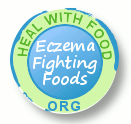The Best Foods to Eat if You Suffer from Eczema

This page presents some of the best foods you can eat if you are an eczema sufferer. While these superfoods are unlikely to cure your eczema completely (according to current knowledge, eczema cannot be cured but it can be managed), they can help you control flare-ups! If you are interested in more general information about eczema and diet, visit our page 5 Diet Tips for People with Eczema. For healthy recipes that combine some of the best eczema fighting foods, visit our Recipe Directory for Eczema Sufferers.
#1: Salmon
Adding salmon to your diet can help control eczema flare ups (provided that you are not allergic to fish). Salmon provides a very good source of omega-3 fatty acids which have been shown to reduce the severity of symptoms in eczema sufferers. Salmon — particularly wild salmon — is also among the best food sources of astaxanthin, a carotenoid that can act as a potent antioxidant. Furthermore, wild salmon contains only low levels of polychlorinated biphenyls (PCBs), harmful chemicals that are often found in high quantities in farmed salmon. That said, moderation should be the key also in the consumption of wild salmon. Too frequent/high a consumption of salmon and other fish may predispose you to an excessive exposure to certain toxins — such as mercury and pesticides — contained in fish. The FDA recommends eating fish twice a week, but not more often.
#2: Watercress
The humble watercress is a true superhero food that has been used to treat and prevent a vast range of ailments. Hippocrates, who called watercress the 'cure of cures', supposedly located his first hospital close to a stream where he could grow watercress to help treat his patients. The modern herbal medicine recognizes the blood cleansing and anti-inflammatory properties of watercress, and many herbalists expressly recommend these little peppery leaves to alleviate eczema. Watercress is available in larger supermarkets year round, and garden cress, which is a close relative of watercress, can be grown at home. If you are interested in cultivating cress crop at home, read the article Growing Garden Cress Indoors.
#3: Apples
An apple a day can keep eczema flare-ups at bay. Apples are one of the best food sources of quercetin — a bioflavonoid that has antioxidant, anti-histamine, and anti-inflammatory properties. Studies suggest that quercetin can help relieve symptoms associated with a number of inflammatory diseases, including eczema. Enjoy apples plain as a snack, slice into oatmeal, or toss in a fruit salad! But be sure to buy organically grown fruit: together with peaches, apples top the list of fruits that contain the highest levels of pesticides and other harmful chemicals (when conventionally grown).
#4: Sweet Potatoes
Sweet potatoes are one of the oldest vegetables known to man. They are also one of the most nutritious vegetables and an excellent addition to your diet if you suffer from eczema. Sweet potatoes are one of the foods that are least likely to cause allergic reactions, which is great news since eczema is often linked to allergies. Further, sweet potatoes contain vitamin C as well as certain unique root proteins which, according to preliminary studies, have significant antioxidant properties. The pink, orange, and yellow varieties are also one of the most concentrated food sources of beta-carotene (the more intense the color, the more beta-carotene).
#5: Fish Roe
A little goes a long way when it comes to fish roe, one of the best natural sources of DHA and EPA. DHA and EPA are omega-3 fatty acids that may help fend off eczema breakouts due to their strong anti-inflammatory properties. Ounce for ounce, fish roe contains even more omega-3s than the fattiest fish. A study that analyzed the roe of fifteen marine animals found that the roe of lumpsucker, hake, and salmon had the most omega-3 fatty acids.
#6: Carrots
You probably know that carrots are good for your vision, but did you know that many naturopaths advocate the consumption of carrots to combat eczema? Carrots are one of the best dietary sources of beta-carotene — a nutrient that is known to help protect the skin. These delicious root vegetables also contain vitamin C and a wealth of other nutrients. When buying carrots it is advisable to choose organically grown produce whenever possible. According to research, conventionally grown carrots are among the most contaminated vegetables (in terms of pesticide and chemical content).
#7: Turmeric
Turmeric is a real superfood that has been used in Ayurvedic and Chinese medicine for centuries. It has been shown to possess anti-inflammatory properties, and anecdotal evidence suggests that this extraordinary root plant of the ginger family might also be effective at alleviating eczema. However, large, placebo-controlled trials are still needed to shed more light into its potential to treat eczema. Turmeric is a key ingredient in Indian style curries, but there are also numerous other recipes that use turmeric: it can be used, for example, to add flavor to fish, seafood, meat, rice, vegetable, and pasta dishes.
Book Recommendation
Also in This Guide
- 5 Diet Tips for People with Eczema
- Anti-Eczema Recipes
- Dairy & Risk of Eczema in Babies
- Is Garlic Good or Bad for Eczema?
- Manuka Honey: A Remedy for Eczema?

